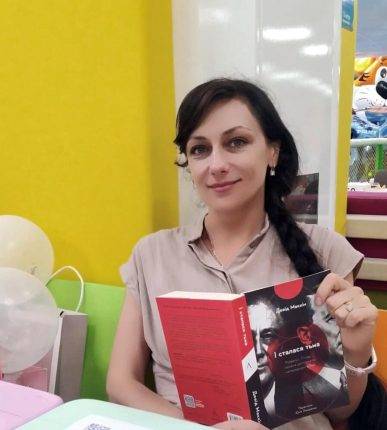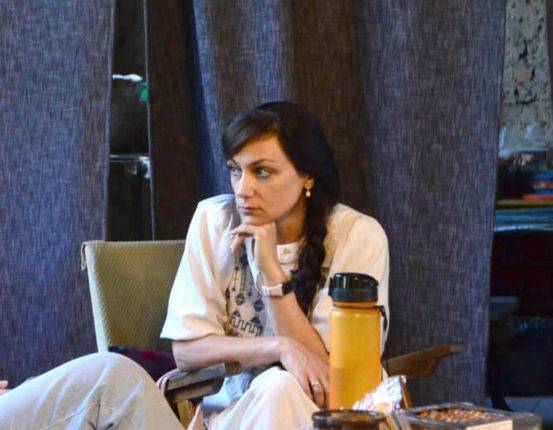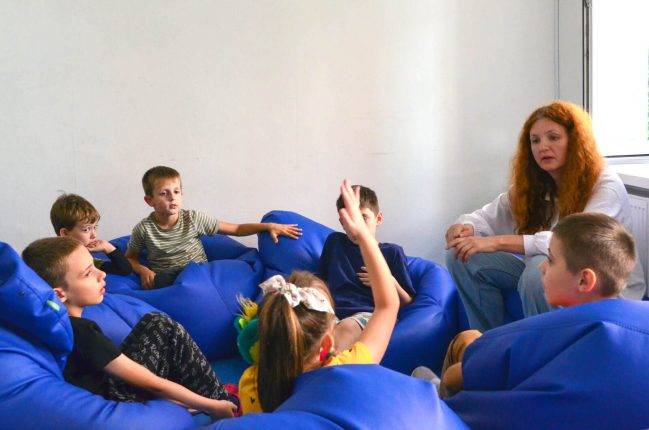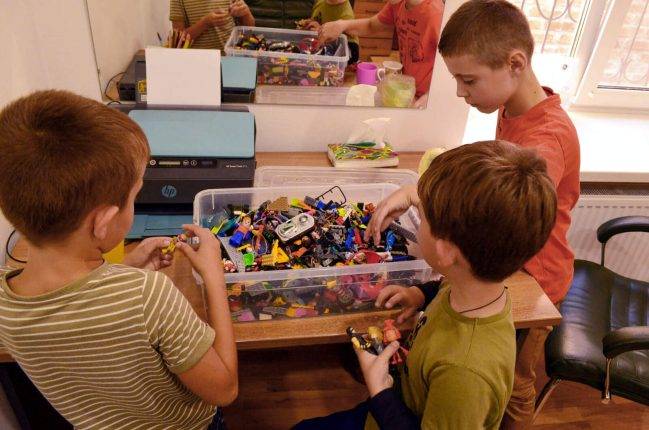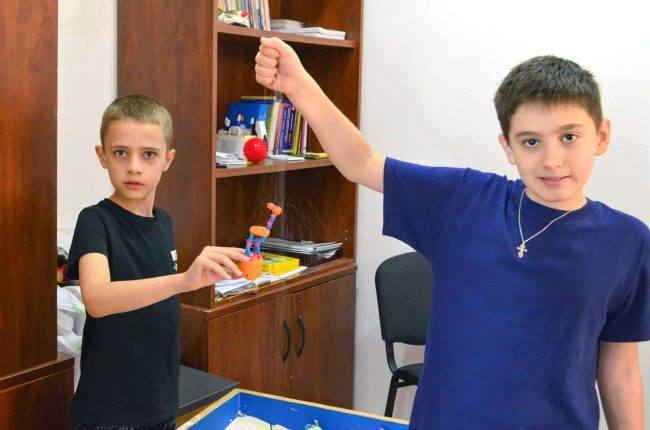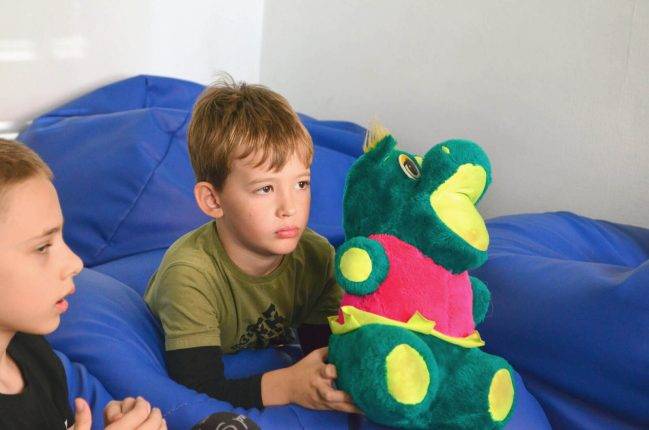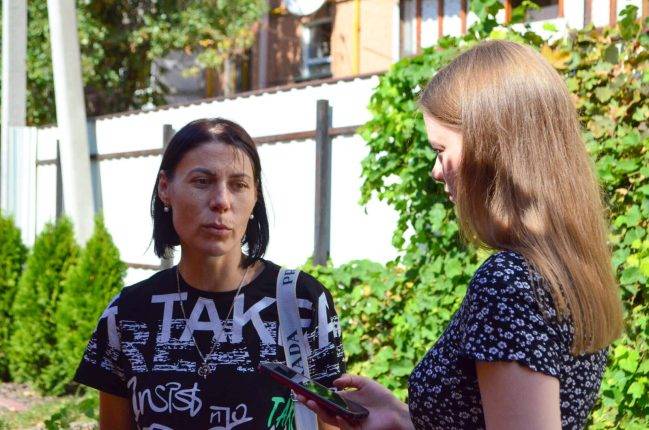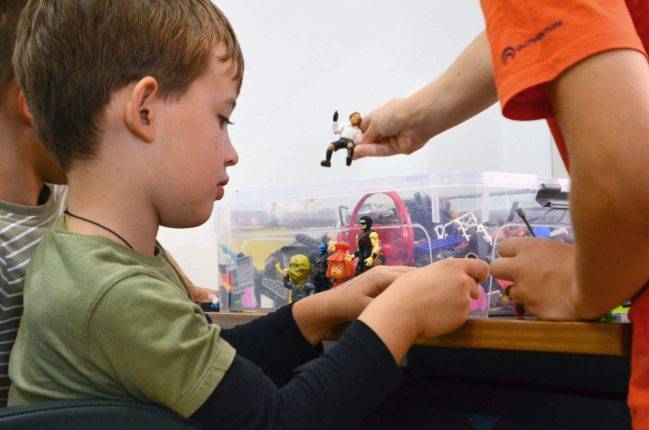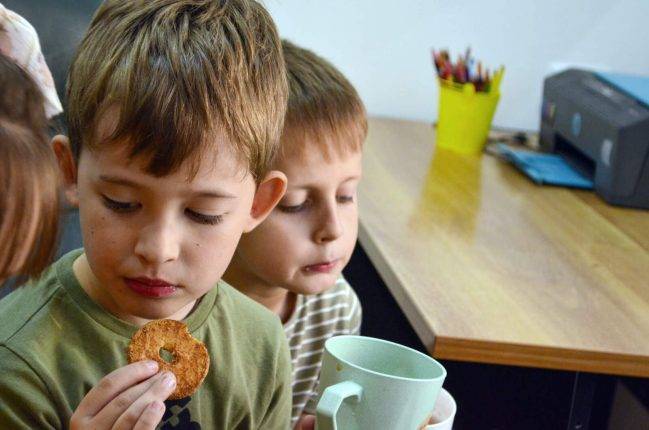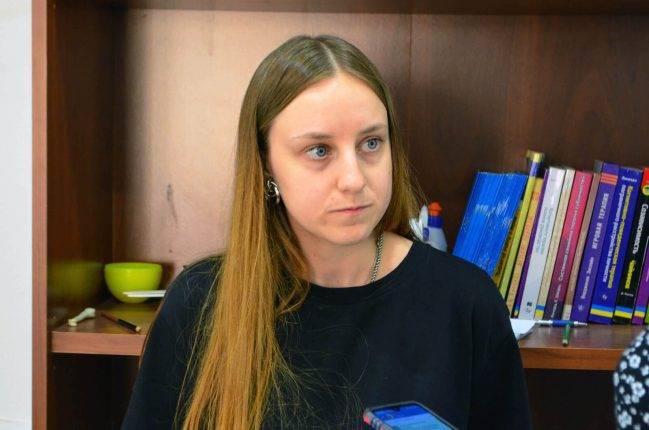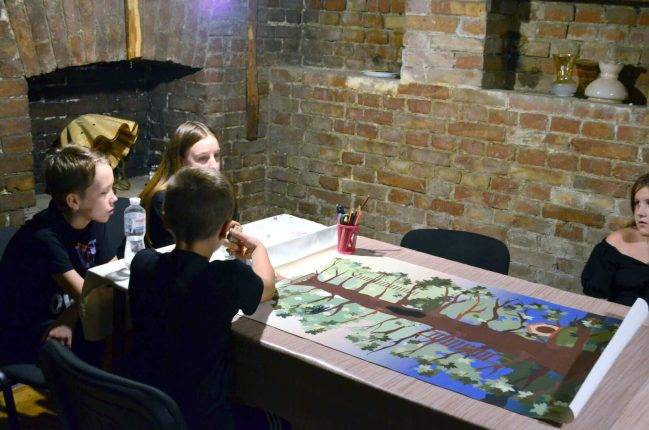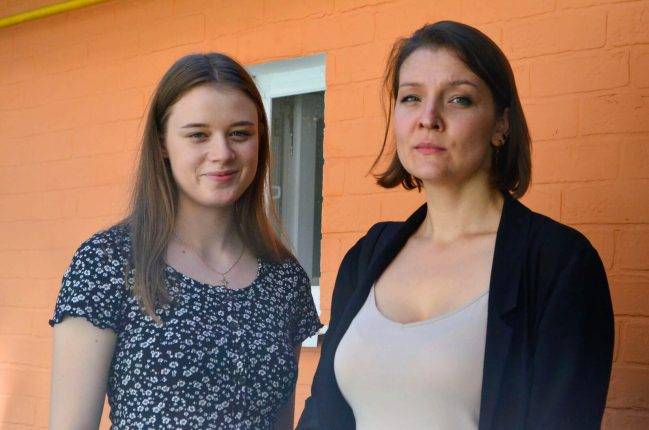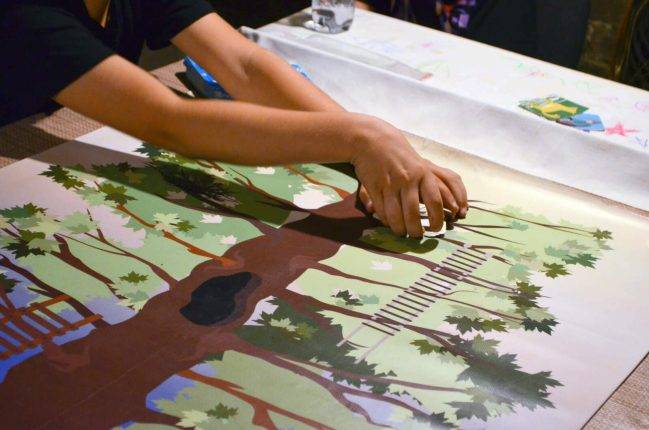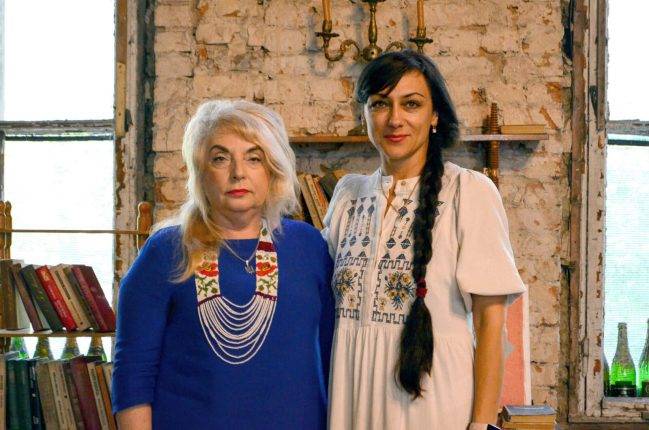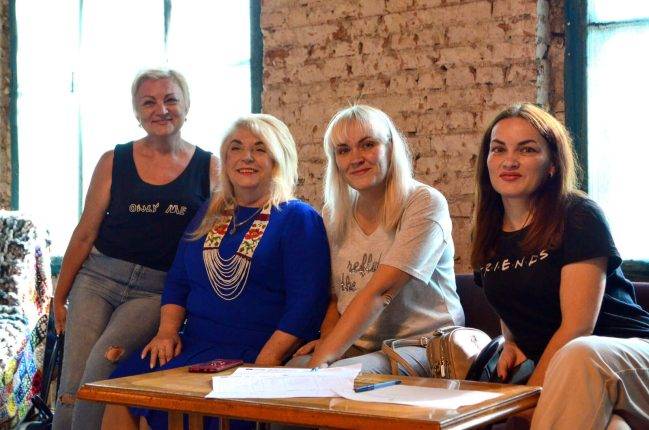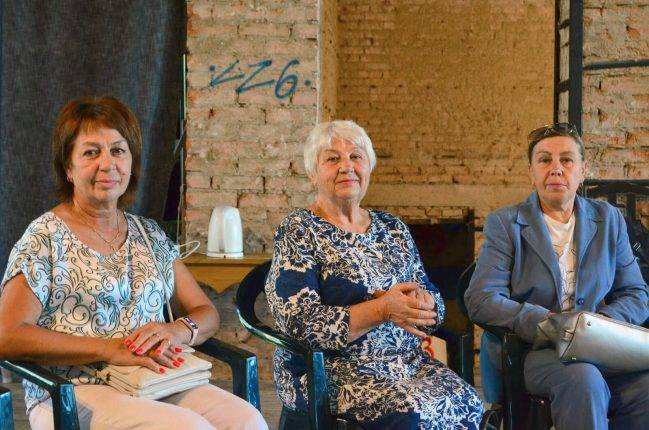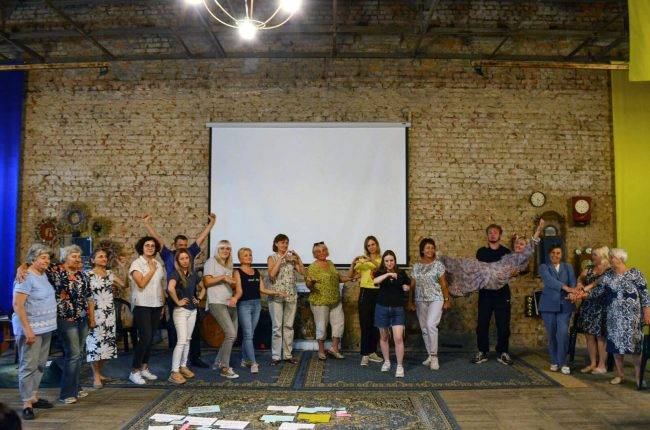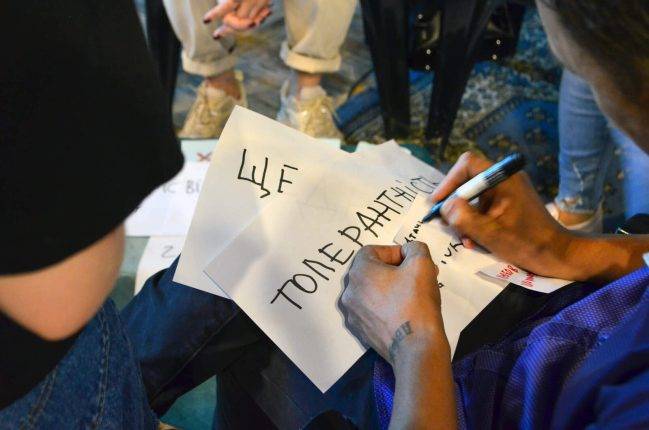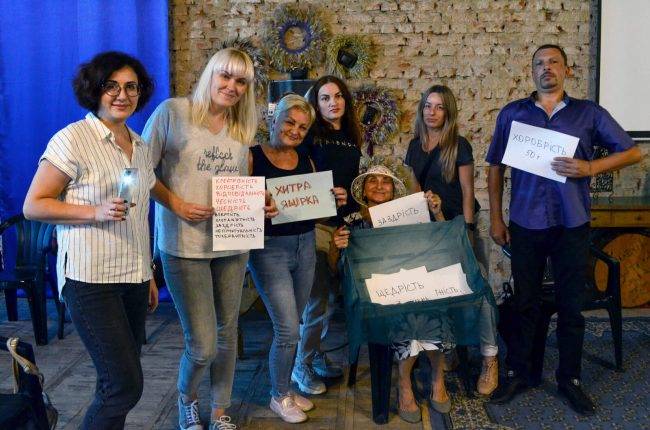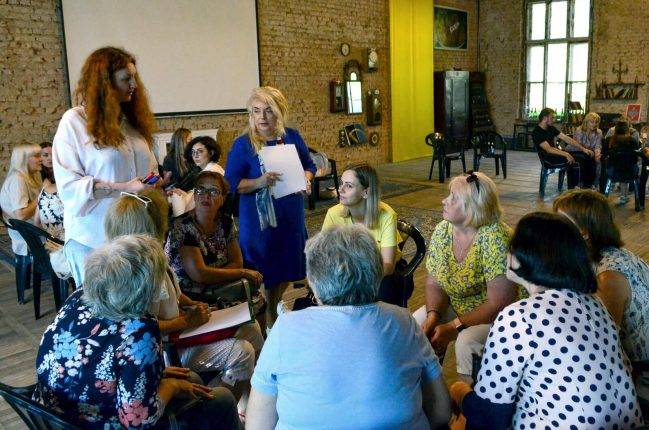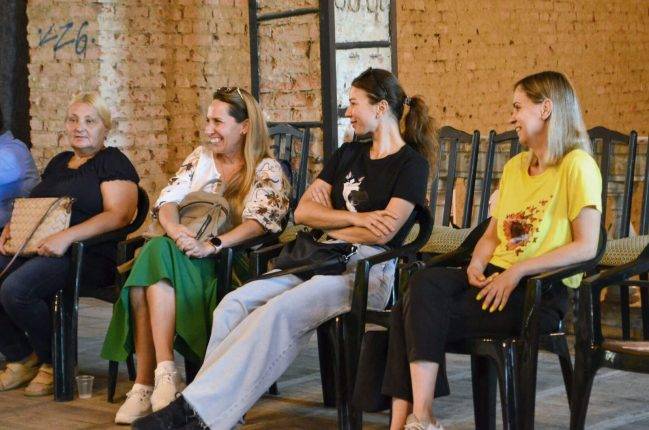
‘Our Support’: the project helping children and adults battle the traumas of war
18/10/2023
Comfortable rooms with soft floor covering, the aroma of tea and cookies, and interesting toys for children of different ages – welcome to the premises of the ‘Our Support’ project in the central Ukrainian city of Kropyvnytskyi, implemented by the ‘Our Council’ NGO with the support of the European Union. The project provides individual psychological consultations, holds communication clubs for children and adults, organises trainings, and entertains its guests with delicacies.
‘Our Council’: supporting IDPs
Yevheniia Zakharchenko is a lawyer. She founded ‘Our Council’ after Russia launched its full-scale invasion of Ukraine. Before that, Yevheniia was involved with another NGO, the ‘Parents’ Council of Kropyvnytskyi’.
“As part of the projects organised by the Parents’ Council of Kropyvnytskyi, we collected and distributed stationery to internally displaced children. I noticed that parents always brought their children along, and they were bored. IDP children and other kids in Kropyvnytskyi don’t have any common spaces, since IDP children usually study online at their schools. I would like to launch a project dealing with their integration into communities,” said Yevheniia.
She added she had been impressed particularly by children’s reactions to ordinary things: toys, colouring books, and puzzles.
“Children have been affected by the war and can’t return to their homes. I really wanted to help them to adapt. The activities of the Parents’ Council were focused. So, I established an organisation dealing with legal and psychological services. Our first project is implemented with the support of the European Union and the East Europe Foundation. ‘Our Support’ is focused on providing psychological support to IDPs,” Yevheniia explained.
The project’s actions include providing individual psychological counselling, conducting surveys to identify the factors preventing IDPs from integrating into the community, and organising psychological support groups for adults as well as children. The latter include one group for children aged 6-8 called ‘Let’s Play and Win!’, a group for children 9-12, ‘Circle of Friends’, and the ‘Teenage Communication Club’ aimed at youngsters between the ages of 13 and 16.
Individual psychological counselling
Internally displaced persons can receive individual psychological counselling provided by ‘Our Support’ project specialists. The meetings were launched in June 2022. Initially, there were few consultations, said Yevheniia, but from September 2022. IDPs started to apply more actively for counselling.
“We noticed an interesting trend. At first, people attend group trainings. IDPs are very distrustful, and it is very difficult for them to open up. At group trainings, people can meet kind and highly qualified specialists. After attending group trainings, people are ready to book individual counselling and open up,” said Yevheniia.
“We try to adapt our services to the needs of people. We can provide urgent counselling by phone. Sometimes, there are difficult cases. For example, something has happened and caused a powerful psychological shock, and a person needs urgent counselling. They can call our psychologist and express their emotions,” Yevheniia Zakharchenko explained.
‘Let’s Play and Win!’: a communication club for children aged 6-8
The NGO calls the children’s groups “communication clubs”. Weekly meetings are organised for children of three age categories. The first group is organised for the youngest – aged 6-8 – and is led by psychologist Inha Kuznetsova.
“Local residents interact harmoniously with internally displaced children. They help each other very much,” Inha said.
The psychologist uses the methods of play and psychodrama therapy. Inha said that after Russia launched its full-scale invasion of Ukraine, she began to visit rehabilitation camps and to work with children who had lived through missile attacks and evacuations. She started to use play therapy and was able to see the results. Children built their homes and bomb shelters and brought food there. Even as an experienced psychologist, it was emotionally very difficult for her to see this.
Inha explained how play therapy can play a key role at this age, helping to deal with negative emotions. When children experience stress, they usually feel paralysed and can’t do anything. They have to play to resume control over their lives and to “rewrite” their traumatic events.
“Prior to the full-scale invasion, I had established a similar group. I used different plots in play activities. Now the key plot is construction. Children miss their homes. This is about a safe place, where ‘I will feel good’. This is about being the author of your own story,” said Inha.
“I will feel good”: how the method works
Inha Kuznetsova recounted the experience of one boy in the group, eight-year-old Max. The boy had undergone several operations. During the first months, he played hospital and the surgeon and treated his friends. Now that he has worked through this plot, the medical theme has receded into the background.
“I like attending the group sessions. Here I play games and build together with my friends,” said Max.
The development of communication skills, which have been greatly affected first by the lockdown and then the war, is also a key aspect of work at communication clubs. The psychologist says that every year is very important for children’s development. If children spend several years under stress and in anticipation of something, they lose something.
Tetiana is the mother of one of the children taking part: “My son needed to learn how to communicate in a team, with children who have different personality traits. Communication skills are very important for both school and life. Now we live under stress and anxiety under martial law. So, we decided to attend the group sessions to promote our son’s stress relief and improve his emotional state.”
The parents are satisfied with the results. Tetiana said her son had found friends in the group and that he looked forward to the sessions on Saturdays.
“These communication clubs play a key role, since they help internally displaced children to adapt and improve their emotional state and develop communication skills,” said psychologist Inha Kuznetsova.
Tips on how to adapt
The psychologist also shared some tips for vulnerable groups that can’t attend similar events:
- More movement. Children should resume movement and role-playing games. Over the two years of the full-scale invasion, children have been exposed to large-scale gadgetisation. Anxiety accumulates in the body, and it becomes stressed. Children should go for a walk, play games, and run whenever they have spare time. All these activities help to react to stress.
- Lowering expectations for children. Parents are overly concerned by their children’s studying. They should remember that their children are growing up in wartime. Even if they don’t fully understand the reality of the situation, they feel and see the anxiety of adults. Parents should lower their expectations for their children, since they will be overtired and will not be able to study.
- Family communication and support. Family members should establish family traditions and support each other.
Helping older children
Psychologist Yuliia Nikitina works with children aged 9-12 and teenagers aged 13-16. In her group work, Yuliia uses psychological tabletop games. The group is focused on socialisation, teambuilding, and the development of emotional competences and cognitive skills.
“Our communication club provides opportunities to meet more local children and integrate into the local community. It also provides the chance to have real-life communication. The participants can freely communicate, drink tea, and eat treats,” says Yuliia.
The first thing the psychologist noticed in her work with teenagers was their better mood and reduced anxiety. “I noticed that teenagers attend the group sessions not only to play games. They arrive earlier just to communicate, while I prepare for the session. In the group, they can share their thoughts and feelings. The communication club delivers efficient results: its participants have their own online chats and can meet beyond our space.”
The head of ‘Our Council’, Yevheniia Zakharchenko, said the areas they focused on really worked: “In the psychological groups, children not only play games, communicate, drink tea, and eat cookies. They also learn how to socialise, find inner resources, and think outside the box.”
Another mother, Yuliia, said the group sessions had helped her 11-year-old son to become more relaxed in his communication with peers.
“We moved to Kropyvnytskyi from Kharkiv, to which we had moved from Luhansk. After attending the group sessions, my son started to react smoothly to his failures, although he is a very emotional boy. My child wants to attend the sessions – and this is the most important thing for me,” the mother said.
Project psychologist Yuliia Nikitina advised teenagers to communicate more and look for similar communication clubs and comfortable spaces, adding she had often noticed that people were prejudiced against themselves and didn’t trust other people.
“If you believe that your community rejects you, you should start with individual counselling. And later, you should transfer to group sessions,” said Yuliia Nikitina.
Conducting surveys among IDPs to improve community integration
One of the activities of the ‘Our Support’ project is conducting surveys among IDPs to improve their adaptation and living conditions in Kropyvnytskyi.
“I can see that people who have left their homes due to the war respond to problems in our city in a different way. We may have resigned ourselves to something, but they haven’t. In Kropyvnytskyi, there was no water supply for four days. The most active internally displaced persons applied to the Cabinet of Ministers, the Office of the President of Ukraine, and the city administration to solve the issue. I like their energy very much! I would like them to share their models with our community,” says the head of ‘Our Council’, Yevheniia Zakharchenko.
The team of ‘Our Council’ also conducted a survey to identify factors preventing IDPs’ integration into the local community. The results of the survey will be considered by the NGO in the development of new activities for the project.
Trainings and psychological groups for adults
The project also organised two psychological support groups for adults of different ages. Yevheniia said the group trainings were attended by people of all ages.
“The participants of the ‘Body-Oriented Therapy’ psychological group can influence their emotional state through physical exercises and relax. In the ‘Resource’ group, people work with childhood memories, since some common life experiences help us to find our inner resources and provide self-care,” Yevheniia Zakharchenko explained.
Recently, the project organised a special event in the format of a psychological theatre led by psychologist-moderator Inha Kuznetsova and psychologist-trainers Nataliia Potapenko and Yuliia Nikitina.
The training was aimed at discovering personal resources and personality traits that help people to cope with difficult situations, and included exchanging experiences, communication, and meeting new friends. One of the key aspects of the activity was integration into the local community.
“This is not the first event held in this format within our project,” said trainer Nataliia Potapenko. “Our events bring together people from across Ukraine. With Inha Kuznetsova, we have been working on psychological theatre since the start of the full-scale invasion. We have held such events at rehabilitation camps for women and children severely affected by the war, people rescued from captivity, and soldiers’ families. This format is very interesting and helps people to open up and discover their creativity. Psychological traumas affect people’s creative abilities. And such interesting exercises help people to ‘become unfrozen’. There are a lot of jokes and fun!” said Nataliia.
Yevheniia Zakharchenko added: “When I attend group sessions, where people tell their heart-breaking stories, sometimes, I leave the room for some time. When we hear stories directly from witnesses, we can feel a completely different level of absorption in them.”
At the training, participants, like former soldier Oleh, were able to discover and present their best psychological qualities and learn about how they can help them to cope with difficult situations. “I didn’t expect to have a good rest, recharge, and get motivated here,” said Oleh. “But today, we had a top-notch team and great teamwork. I’m enthusiastic about the training! My stress was reduced and I’m in a good state of mind!”
The project ‘Our Support’ is implemented by the NGO ‘Our Council’ within the ‘Phoenix: Resilient Ukraine in the Time of War’ project, which is implemented by the East Europe Foundation with the financial support of the European Union.
Under the ‘Phoenix’ project, 16 more NGOs from across Ukraine received grants to implement initiatives aimed at supporting internally displaced persons, providing them with psychological support, empowering IDPs in employment and adaptation to new communities, etc.
Author: Sofiia Tkachenko
Article published in Ukrainian by Znamyanka.City
Stories
-
Katarina Mathernova: If Ukraine had a human face and a human spirit, it would be 10-year-old Roman Oleksiv
-
A regional mission to drive social entrepreneurship: the story of Ksenia Kosukha
-
EU restores safe water supply for 100,000 Ukrainians affected by war
-
Promoting IT during the war: Lviv IT cluster and how EU4Digital helps
-
Frontline digitalisation: Kharkiv IT Cluster collaborations
-
How EU4Youth is driving opportunity and success among young Ukrainians
